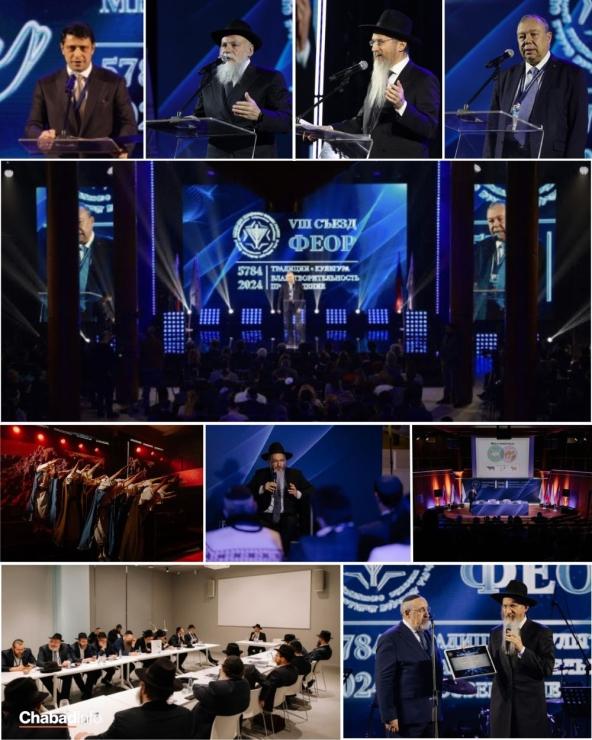Seforim Battle Takes a Strange Turn
The Chabad chassidus has been locked in a faceoff with the Russian government over possession of a priceless seforim library for more nearly three decades. Moscow declares that the collection of rare published volumes, manuscripts, and notes assembled by the rebbes of Chabad, in limbo for more than a century, is part of Russia’s cultural heritage. Lubavitchers, understandably, would like to see the tomes reunited with the extensive Chabad archive maintained at the chassidus’s headquarters in Crown Heights • Full Story
This article originally appeared in Mishpacha Magazine, Issue 838.
Has Chabad finally gained the ace it needs to make Vladimir Putin fold?
The Chabad chassidus has been locked in a faceoff with the Russian government over possession of a priceless seforim library for more nearly three decades. Moscow declares that the collection of rare published volumes, manuscripts, and notes assembled by the rebbes of Chabad, in limbo for more than a century, is part of Russia’s cultural heritage. Lubavitchers, understandably, would like to see the tomes reunited with the extensive Chabad archive maintained at the chassidus’s headquarters in Crown Heights.
But in the latest development in this long-running dispute, a recent US District Court ruling handed Chabad a pretty significant bargaining chip —the gleaming office tower that holds the headquarters of Tenex-USA, rising above an exclusive lane in Washington, D.C., within blocks of the White House. Tenex, owned by Russia’s state nuclear agency, touts itself as one of the world’s largest sellers of all things nuclear —including rare earth metals, low-enriched nuclear fuel, and an array of services “that have not previously been available in the US market.”
Federal judge Royce Lambert ordered that the building be turned over to Chabad in consideration for a debt he imposed seven years ago. When the Russians declared they would no longer cooperate with the American court proceedings, Judge Lambert hit them with a fine of $50,000 for each day the seforim library remained in their possession. With the passage of time, that obligation has ballooned to $100 million — which is why Judge Lambert now ruled that the building should go to Chabad.
Now, a chassidic group more versed in Gemara and Tanya than gamma rays and isotopes is not likely to actually become the owner of the Tenex company.
Nathan Lewin, the famous attorney who’s been litigating the case, laughed when asked if Chabad would become the first chassidic group with a nuke factory.
“Right now we are preliminary to that, this is not a seizure yet,” said Mr. Lewin, who has argued cases on behalf of the religious community for the past half century. “We are just trying to get the information, on the basis of which we can seize the assets. The judge hasn’t approved seizing anything. The judge has only said that you can force them to disclose information that may result in a seizure.”
Lewin added that the factory, if it is seized, would be just enough to cover the daily $50,000 fines ordered by the judge seven years — not the library itself.
“Chabad’s view is, they want the library,” Mr. Lewin said. “The judge has said, and the law in the United States is, that unless you comply with the order in the court, you can be fined. Now that the fines have added up to over $100 million, maybe Putin will say, ‘Okay, instead of giving up all that money, I’ll give up the library.’ ”
The Russian Psyche
Rabbi Berel Levine, head librarian of Agudas Chasidei Chabad, located in Crown Heights, is hopeful the threat of such a huge fine will induce President Vladimir Putin to send over the library. He is dismissive of the possibility that this latest ruling will end the mission assigned to him by the late Lubavitcher Rebbe.
“All I can tell you is that it’s just one more step in a long, long journey,” said Rabbi Levine, who once spent over a year in Moscow trying to retrieve the precious books. “What it means, I don’t know. Your guess is as good as mine.”
The story of how Chabad reached this point has all the elements of a novel, with international intrigue, drama on the steps of the Russian State Library, and a new branch of that library being established in a Moscow shul. Even Mikhail Gorbachev, the last ruler from the country’s Communist days, put in a cameo appearance.
But Moscow’s local Chabad shaliach, Rabbi Berel Lazar (who also serves as Russia’s chief rabbi), is in an uneasy situation. Back in the early stages, he expressed opposition to going to court, noting that confrontation does not work with the Russian psyche.
“It’s a very complicated and very delicate issue,” he said. “The only way there will be a solution to this is through negotiating with the Russian authorities. I once heard that the Lubavitcher Rebbe said that ‘the Russians are going to eventually give back the books with a smile.’ ”
The story, in Rabbi Levine’s telling, began in the waning days of World War I, when the German military approached the Russian town of Lubavitch. The Rebbe then, Rav Sholom Dovber (known among Chabad chassidim today as the Rashab), along with his son Rav Yosef Yitzchak, were forced to flee. The rebbes of Chabad always collected seforim — which included rare manuscripts of the divrei Torah that eventually became the bulk of their seforim, writings that were unpublished, and seforim whose value lay in the fact that they were used by tzaddikim — and as they fled, the Rebbe took along some of the more precious books, and entrusted the rest with a private warehouse in Russia.
Although the Germans withdrew and the Tzar was toppled, the warehouse remained out of reach. Within months the new despotic Communist government came to power and nationalized the collection. The Rashab was niftar in 1920, and despite Rav Yosef Yitzchak’s best endeavors, he was unable to retrieve it. The Bolsheviks first offered it to him for sale, but he didn’t have the funds. He was later sentenced to death for his activities in the Torah underground, but was expelled after a global outcry. He moved to New York, taking along valuable manuscripts from generations of Chabad rebbes, but not the archive of seforim prized by their kehillah.
“We see from the books that are part of our collection that there are more important books in the library in New York,” explained Rabbi Lazar, who has served in his position for the past three decades. “Its main value is the kedushah, because it belonged to the Lubavitcher Rebbes. That is something that’s priceless. But the books themselves are not unique.”
Cold War Casualty
Chances of Chabad getting the archive back nosedived when the Nazis occupied Poland in 1939 and transferred the seforim to a castle in Germany. A Red Army counteroffensive five years later brought them back into Russian possession, but this time as war booty, along with art from Poland, gold artifacts from Germany, and paintings from Hungary.
The efforts to get back the books waxed and waned, as the Soviet Union convulsed with anti-Jewish plots and the Cold War, and Chabad set about building a global community of shluchim that focused more on bringing Jewish souls home than fetching seforim home. From time to time they would get a few seforim that had been found in Poland, but the Russian obstinacy remained the same — the collection was war booty, captured from the Germans in revenge for bombing Russian artwork and museums.
The first glimmer of hope came in 1991, when Soviet premier Gorbachev, three months before he was ousted in a coup, ordered the entire archive returned to New York. Chabad then filed a lawsuit in Russian courts, which placed a lien on the books and later ruled that they should be reunited with the New York library.
That all turned to dust with the implosion of the Soviet Union in December of that year. The director of the state library refused to honor the order, inciting a group of hooligans on the steps of the State Library when the Chabad delegation came to pick it up. The government then declared that only Russian laws would govern where the “Schneersohn Collection” would end up.
The Rebbe, meanwhile, sent various messengers to Russia after the Communist government fell, attempting to get the collection back. He even sent four shluchim, including Rabbi Levine, to Russia and ordered them not to come back without his father-in-law’s books. They toiled there for a year and a half before the Rebbe allowed them to come home, empty-handed.
Left with no other choice, Chabad in 2004 filed a lawsuit in Washington. Putin’s government vigorously contested the case, arguing that a US courthouse had no jurisdiction over a foreign nation. The dispute lingered for five years, when US District Judge Royce Lamberth issued a final ruling that it did, in fact, have power. Putin promptly absconded from the case.
The judge held the Russians in contempt of court and awarded Chabad $50,000 a day that Russia did not return the books. By now, that would come out to over $100 million — or the approximate value of the only property Chabad was able to locate in the US that is owned by the Russian state, the Tenex nuclear parts manufacturer.
Attempting to get the case off his back, Putin announced in 2013 that he would be housing the books in the Jewish Museum and Tolerance Center attached to Rabbi Lazar’s shul — and making it a part of the state library.
“He didn’t give them over, he just transferred the location of the books from the state library to our museum,” Rabbi Lazar said. “The symbolism of that was to say that anyone can come and learn from the books. When the president decided to do that, he didn’t ask us our opinion if we agree or we disagree, he just decided to transfer the books. He actually came to the museum on the day that it arrived and announce that for him, the story is over.”
The exact size of the collection is unknown: it is estimated to number between 4,500 to 11,000 seforim, most of which have been digitized and are available online.
“Putin believes that they are part of the Russian heritage and there is no reason to send them abroad,” Rabbi Lazar explained. “I’ve heard the argument in the past that if they send these books abroad, then there will be other countries that will also claim that the Russians took away their belongings as war booty.”
But the judge in the case, as well as Rabbi Levine and library representatives, refused to accept the move as fulfilling the court order. Two weeks ago Friday, Judge Lamberth gave Chabad the go-ahead to seize Tenex.
But it’s not the end of the story, all of the protagonists acknowledge.
“My personal desire,” Rabbi Lazar said, “is that the books should be given to the library in New York. That would be my dream — that is the dream of any chassid, to have the library reunited. We strongly believe in miracles, but unless they find some kind of compromise, I don’t see any solution.”
“The end goal,” Mr. Lewin said, “is to try to find funds — I mean, they’re not taking over any factory, they’re trying to find funds in order to be able to force Russia to give up the library. If we threaten to collect $100 million from Russia, they may hand over the library.”
477
Join ChabadInfo's News Roundup and alerts for the HOTTEST Chabad news and updates!











































